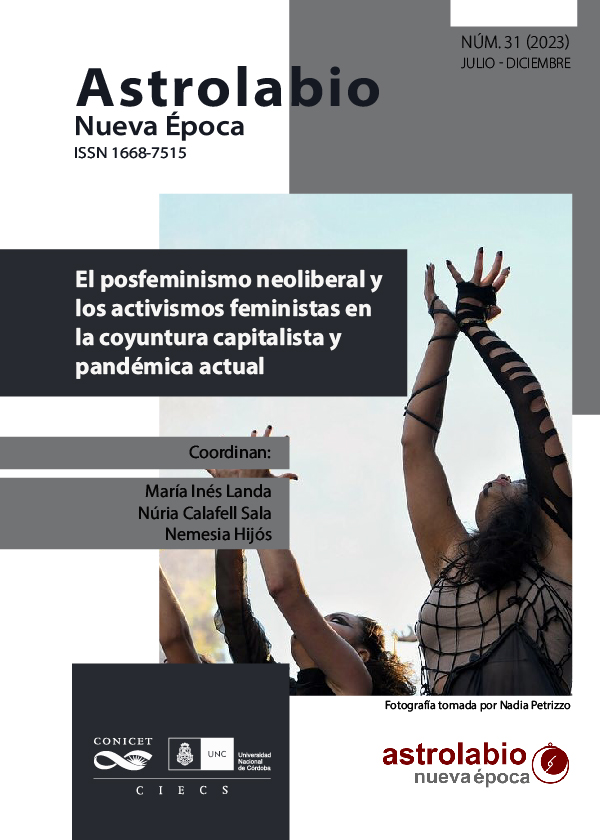“If you look great, you feel great”: Instagram and the Construction of Aesthetic Treatments as Technologies of the Self
Main Article Content
Abstract
Minimally invasive aesthetic treatments, such as hyaluronic acid and botulinum toxin injections to fill and shape different parts of the face, have recently become particularly popular in Argentina. The use of the Instagram platform for the promotion of these services is also widespread among doctors and aesthetic clinics. Thus, this social network becomes a space where professionals show, describe, explain and encourage this type of procedures. Our research aims to analyze the meanings that revolve around these treatments, focusing on the conception of the body that underlies these practices, the aesthetic criteria that are put into play, the forms of interpellation to women as the main consumers of these services and the transformations they promise. From the analysis of four Instagram accounts oriented to the promotion of aesthetic treatments in Mendoza and four in-depth interviews with the doctors responsible for these accounts, we analyze, firstly, the conception of the body as a continuously perfectible project and the relations of tension and complementarity between classical aesthetic criteria and contemporary criteria; secondly, we describe the notion of the soul as an asymptotic project, with particular psychic and affective anchors and certain paradoxical tensions. We conclude that aesthetic treatments are constructed as technologies of the self, converging with an aesthetic/ethics fostered by the neoliberal ethos.
Article Details

This work is licensed under a Creative Commons Attribution-NonCommercial-ShareAlike 4.0 International License.
Astrolabio, Nueva Época está protegida bajo licencia Licencia Creative Commons Atribución-NoComercial-CompartirIgual 4.0 Internacional. La propiedad intelectual de los artículos pertenece a los autores y los derechos de edición y publicación a la revista. Los artículos publicados podrán ser usados libremente para propósitos científicos y académicos, siempre y cuando se realice una correcta citación de los mismos. Cualquier persona física o jurídica que desee reimprimir parte o la totalidad de algún artículo, deberá obtener permiso escrito de los editores de Astrolabio Nueva Época, quien lo otorgará con el consentimiento del autor.
How to Cite
References
AHMED, Sara. (2019). La promesa de la felicidad. Una crítica cultural al imperativo de la alegría. Buenos Aires: Caja Negra.
ARIAS, Valentina. (2023). “Mujeres jóvenes y construcción de imágenes sexuales. Fuentes de inspiración y espacios de regulación a la hora de prácticas sexting”. Millcayac, 10-18, sin paginación. Disponible en: https://revistas.uncu.edu.ar/ojs3/index.php/millca-digital/article/view/6355 [consulta: marzo de 2023].
BARBOZA, Romina. (2022). “Gubernamentalidad algorítmica y subjetividad”. Textos y Contextos, 24, 1-12. Disponible en: https://revistadigital.uce.edu.ec/index.php/CONTEXTOS/article/view/3483 [consulta: setiembre de 2022].
CANO, Virginia. (2018). Solx no se nace, se llega a estarlo. Ego-liberalismo y auto-precarización afectiva. En Malena Nijensohn (comp.), Los feminismos ante el neoliberalismo, pp. 27-38. Buenos Aires: La Cebra.
CHEN, Jonlin; CHOW, Amanda; FADAVI, Darya; LONG, Chao; SUN, Alexander; COONEY Carisa; y BRODERICK, Kristen. (2021). “The Zoom Boom: How Video Calling Impacts Attitudes Towards Aesthetic Surgery in the Covid-19 Era”. Aesthetic Surgery Journal, 41-12, 2086-2093. Disponible en: https://academic.oup.com/asj/article/41/12/NP2086/6318806 [consulta: agosto de 2022].
CÓRDOBA, Marcelo. (2019). La cirugía estética y la normalización de la subjetividad femenina: un análisis textual. Córdoba: CEA.
ELIAS, Ana Sofía y GILL, Rosalind. (2017). “Beauty surveillance: the digital self-monitoring cultures of neoliberalism”. European Journal of Cultural Studies, 21-1, 59-77.
FOUCAULT, Michel. (1990). Tecnologías del yo y otros textos afines. Barcelona: Paidós.
GILL, Rosalind y SCHARFF, Christina (eds.). (2011). New Femininities: Postfeminism, Neoliberalism and Subjectivity. Basingstoke: Palgrave MacMillan.
GROYS, Boris. (2014). Volverse público: las transformaciones del arte en el ágora contemporánea. Buenos Aires: Caja Negra.
ILLOUZ, Eva. (2018). Emotions as commodities: Capitalism, consumption and authenticity. New York: Routledge.
ISAPS. (2020). ISAPS Global Survey Press Release. International Society of Aesthetics Plastic Surgery. Disponible en: https://www.isaps.org/medical-professionals/isaps-global-statistics/ [consulta: julio de 2022].
JACUBOVSKY, Daniel. (2010). “Rejuvenecimiento facial”. Revista Médica Clínica Las Condes, 21-1, 99-106.
LANDA, María Inés y CÓRDOBA, Marcelo. (2020). “Cuerpos moldeables y vidas modulables: la invención del estado holísticamente saludable como bienestar (integral)”. Arxius, 42, 59-74.
LAVAL, Christian y DARDOT, Pierre. (2013). La nueva razón del mundo. Ensayo sobre la sociedad neoliberal. Buenos Aires: Gedisa.
LAZAR, Michelle. (2011). The right to be beautiful: Postfeminist identity and consumer beauty advertising. En R. Gill y C. Scharff (eds.), New Femininities: Postfeminism, Neoliberalism and Subjectivity, pp. 37-51. Basingstoke: Palgrave Macmillan.
PITTS-TAYLOR, Victoria. (2007). Surgery Junkies. Wellness and Pathology in Cosmetic Culture. New Brunswick: Rutgers University Press.
RAMPHUL, Kamleshun. (2021). “«Zoom Dysmorphia»: the rise of a new issue amidst the pandemic”. Acta Biomedica, 92-6, 1-2. Disponible en: https://mattioli1885journals.com/index.php/actabiomedica/article/view/12523 [consulta: julio de 2022].
RETTBERG, Jill Walker. (2014). Seeing Ourselves Through Technology: How We Use Selfies, Blogs and Wearable Devices to See and Shape Ourselves. Basingstoke: Palgrave Macmillan.
RICE, Shauna; SIEGEL, Julia; LIBBY, Tiffany; GRABER, Emmy; y KOURUSH, Arianne. (2021). “Zooming into cosmetic procedures during the Covid-19 pandemic: The provider’s perspective”. International Journal of Women's Dermatology, 7-2, 213-216.
ROSE, Nikolas. (2012). Políticas de la vida. Biomedicina, poder y subjetividad en el siglo XXI. Buenos Aires: UNIPE.
TOLENTINO, Jia. (2019). “The Age of Instagram Face”. The New Yorker, 12 de diciembre. Disponible en: https://www.newyorker.com/culture/decade-in-review/the-age-of-instagram-face [consulta: julio de 2022].
VAN DIJCK, José. (2016). La cultura de la conectividad: una historia crítica de las redes sociales. Buenos Aires: Siglo XXI.
VASILACHIS, Irene. (2006). Estrategias de investigación cualitativa. Barcelona: Gedisa.

